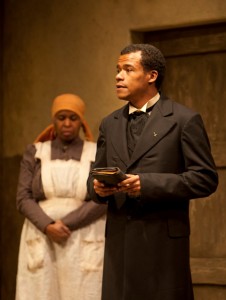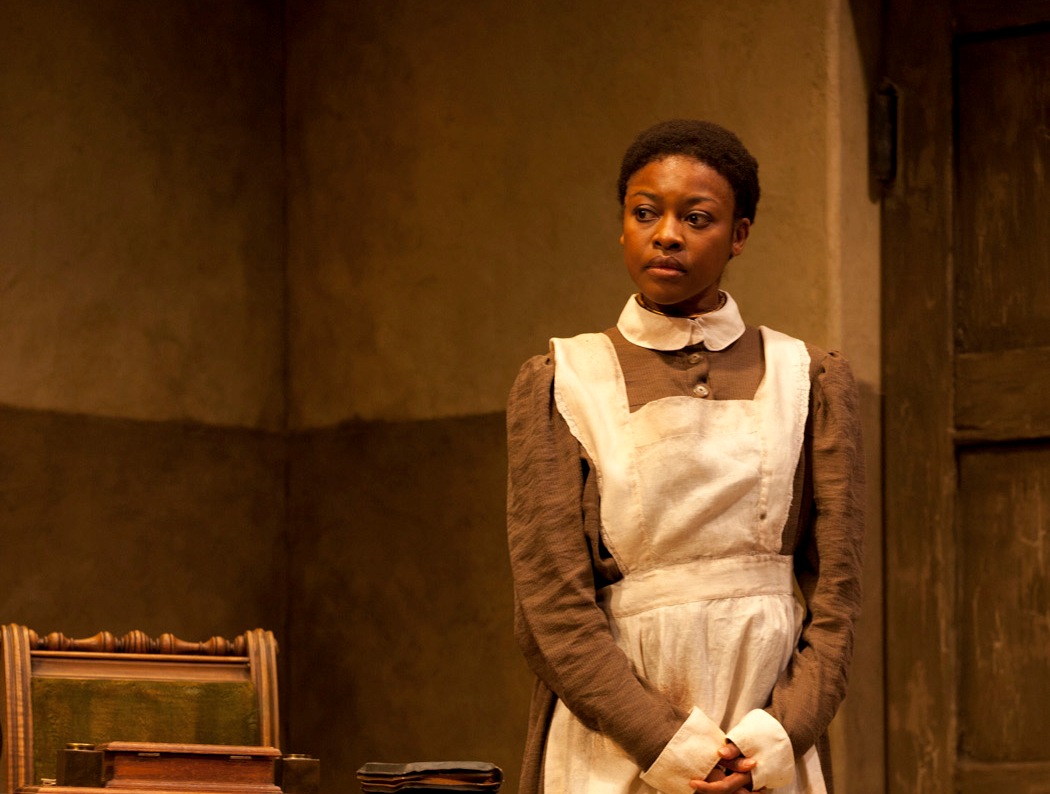
Cheryl Lynn Bruce and LeRoy McClain in a scene from THE CONVERT, running at McCarter Theatre Center in Princeton, NJ. (Photo credit: T. Charles Erickson)
Life can be very simple when defined entirely by ideology. Step one: learn dogma. Step two: live by dogma. Step three: propagate dogma. When in doubt, consult the instructions. As no ideology can account for all life’s complexities, however, the deepest test of a person’s faith and a dogma’s validity arises from the gray areas where faith in an idea clashes with experience in the everyday. This clash is the crucible of ideology, the often terrifying and at-times violent site where belief is tested and a person must reconcile faith and experience.
These are the timeless conflicts underwriting The McCarter Theatre’s world premiere of THE CONVERT, by Danai Gurira. The play locates itself at the tense intersection of two wholly incompatible belief systems, examining the rising pressures of assimilation, and the dangerous consequences of its absence. It is a play deeply concerned with the humanist stake in clashes of ideas, asking us to consider not who is right or wrong, but rather what space remains for the individual, family, and community within rigorous structures of religion and politics.
These are not simple questions, and Ms. Gurira’s play wisely avoids offering simple answers. Though perhaps in need of a stronger editorial eye, THE CONVERT’s three hours offer a wealth of challenging ethical conflicts that the play is not hubristic enough to try to solve for us. Rather, with an at-times plodding thoroughness of purpose, the production dedicates itself to examining the many problematic dimensions of family and religion within the scope of oppressive colonial politics.
Set in the southern Africa of Queen Victoria’s late-nineteenth century British colonialism, THE CONVERT’s focus is Chilford, an African man fully assimilated into the white British culture and its attendant Roman Catholicism, and the young girl who we first meet as Jekesai, a newly orphaned African taken in by Chilford as a servant and pupil in the ways of Catholicism and Western civilization.
Chilford quickly renames the girl Ester—“a name that expresses a Christian faith”—and sets to the task of teaching her the English language, the Catholic religion, and British manners. Chilford’s personal mission statement is “to civilize our people” out of the “deepest deep of barbaric practices” through spiritual and academic schooling, and Ester arrives at his home as a prime candidate for this particular brand of civilizing. The girl turns out to be a prodigy in Chilford’s teaching, quickly learning English, rote knowledge of the Bible, and a boundless love of Jesus Christ.
But Ester is not typical of her African community: many locals are very angry at the British intrusion, and resist the sort of assimilation eagerly grasped by Ester and taught by Chilford. These locals chafe at being told their spiritual practices are wrong, and resent even further being made to work in the mines for wages that only became necessary by the economic systems established by the British. Rebellion is brewing, and natives like Chilford and Ester who have fully adopted the white, British ways are as much of a target as the British themselves.
As the play progresses, the faith of both its central characters is constantly tested, but Ester especially becomes the subject of soul searching. When duty to her family is at odds with her new devotion to Catholic ideology, she must navigate the tumultuous terrain between Chilford’s spiritual expectations, and the lasting residue of her life as Jekesai. The play’s central conflict arises when the girl becomes torn between Ester’s devotion to Catholicism, and Jekesai’s powerful bonds of kinship. The conflict proves harrowing for the young girl, and we watch as she struggles to find her ethical bearings.

Pascale Armand stars in McCarter Theatre's THE CONVERT. (Photo credit: T. Charles Erickson )
Starring as Jekesai/Ester, Pascale Armand excels at her duty of showing us a character who thinks she completely understands her devotion, and struggles as a result to respond to challenges when that devotion shows itself to be not-so-simple. In an early scene, Chilford is upset with his prize protégé because she has corrected a white British missionary on a misquotation of the Bible. Chilford’s anger of course makes no sense to Ester: the missionary made a mistake about the Bible, and her correction was making the word of God as clear as possible. This is what Chilford has always instructed her to do; what could possibly be the problem? At issue, of course, is politics, but Ester does not recognize the quotidian complication to her dogmatic teaching, and Ms. Armand does very well to embody her character’s utter confusion. Ester wants so badly to believe everything her spiritual teacher has told her, but the real world is forcing him to contradict himself. Ms. Armand shows us Ester’s struggle with admirable nuance.
THE CONVERT’s most fascinating character might be Zainab Jah’s Mistress Prudence. Here is a highly educated African woman, embodying all the trappings of the assimilated African-British culture, but always aware of the social and political landscapes surrounding her. Like the leader of a Greek Chorus, Prudence understands the stakes of her society’s conflicts, and recognizes the directions of the socio-political climate’s winds. In moments of privacy between her and Ester, or in times after she has experienced great trauma, Prudence reveals a unique cunning that gives depth at once to her character and to the potential of the African people. When THE CONVERT’s social structure challenges even Prudence’s savvy, we realize how deeply this society is mired in tumult.
Quite long, and built upon several layers of thorough and meticulously delivered exposition, THE CONVERT is not for the faint of theatrical will. Ms. Gurira takes her time, clearly prioritizing demonstrating the complexity of the play’s conflict over efficiency or dramaturgical nuance. The decision makes for a long evening. Eschewing any simplicity of purpose or agitprop directness, though, THE CONVERT offers rewards to those who are willing to engage its ideas. Like all history plays, it is most relevant in the analogues it can suggest to the present, and in that THE CONVERT delivers. Ms. Gurira’s play calls for increased attention to the human consequences of social, political, and religious structures, going to great lengths to demonstrate complexity within ideology’s seeming simplicity.
THE CONVERT
Written by Danai Gurira
Directed by Emily Mann
January 13 – February 12, 2012
McCarter Theatre Center
in association with Center Theatre Group and Goodman Theatre
91 University Place
Princeton, NJ, 08540
609-258-2787
http://www.mccarter.org/
http://www.mccarter.org/theconvert/index.html


